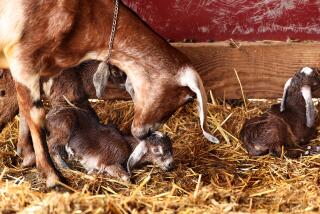Koreatown leaders find message of unity in visit to L.A. temple
Jews and Koreans have been neighbors for nearly four decades in the area that has become Los Angeles’ Koreatown, but for the first time, Asian immigrant leaders on Tuesday ventured inside the landmark Wilshire Boulevard Temple, Southern California’s oldest Jewish congregation.
In what organizers said was a “historic initiative” to develop a beneficial relationship between the two communities, Wilshire Boulevard Temple held an open house for Korean American leaders who toured the museum-like facility, which is steeped in history. This is the temple’s 145th year in Los Angeles.
“It is very, very impressive,” said William Min, an attorney who has practiced law on Wilshire Boulevard for decades. “We come from an old country of culture too, but this place has a real magnificent depth.”
Like many Korean Americans, Min had walked by the domed structure, wondering what it looked like inside.
The effort to build stronger ties between the communities comes at a time when an anti-Semitic cartoon book in South Korea has been denounced by Jews and Korean Americans in Los Angeles, which is home to the largest Korean population outside Asia.
Earlier this week, the author of the comic book agreed to alter the offensive images.
Tuesday’s event had been in the works for months, since Rabbi Stephen Julius Stein and Charles Kim, national president of the Los Angeles-based Korean American Coalition, met last summer after Kim had called the synagogue to ask if the building was for sale.
“We can’t sell you the temple, but how about building a relationship?” Stein recalled telling Kim.
That led to several meetings and in early December, Kim invited Stein to speak at a Koreatown Rotary Club gathering at the JJ Grand Hotel across the street from the temple.
Stein had never been inside the hotel and compared his visit to 6,000 miles -- “the distance between Los Angeles and Seoul.”
During the news conference preceding the tour, Senior Rabbi Steven Z. Leder and Stein, director of the synagogue’s Center for Religious Inquiry, as well as Kim spoke of how much the two communities have in common.
Leder also recalled how the 1992 riots devastated the neighborhood and how he and others from the temple attended services at Youngnak Presbyterian Church of Los Angeles to show their solidarity with the Korean American community.
“When we come together -- Jews and Christians -- and explore not only that which is different among us religiously, but so much of what is in common between us religiously, then it becomes ever more natural for us to be in a relationship with each other,” Stein said in an interview.
“We’re peoples who have understood the pain of persecution, oppression and discrimination and still battle it today,” he added.
Jewish and Korean American leaders said they hoped this first step would lead to a deep relationship.
“Whether it be religious encounters or social justice issues or cultural exchanges, it seems so natural and it feels right to be doing this right now,” Stein said.
Kim said opportunities for Korean American groups to rent facilities in the temple for social and professional gatherings will be a boon to the community.
Koreatown is the spiritual capital of Koreans in the United States and many important social, religious and professional meetings take place there.
Lack of sufficient space has been a long-standing problem.
Kim said the invitation to use Wilshire Boulevard Temple’s facilities, which include an 1,800-seat sanctuary, a 600-seat auditorium and a 300-seat banquet hall, is welcome.
“They are going to give us their member rate,” he added with delight.
Leaders said the two communities will also join forces to address issues affecting the Koreatown community, such as crime, poverty, the granting of multiple liquor licenses and the idea that growth should take place in a thoughtful way.
For Leder, the meeting brought to mind Psalm 133: “Behold, how good and how pleasant it is for brethren to dwell together in unity!”
*
More to Read
Start your day right
Sign up for Essential California for news, features and recommendations from the L.A. Times and beyond in your inbox six days a week.
You may occasionally receive promotional content from the Los Angeles Times.





